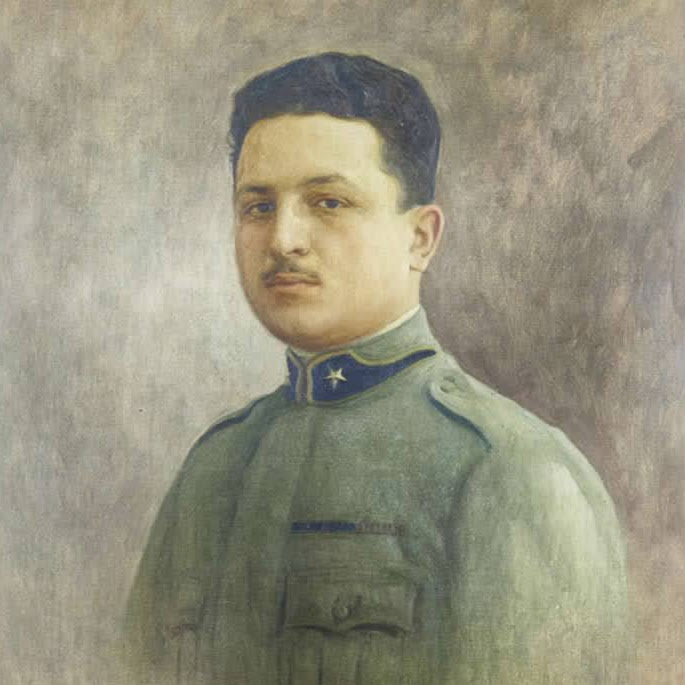- About Us
- What is NRDC-ITA
- Where We Are
- UGO MARA BARRACKS
- UGO MARA'S LIFE

UGO MARA'S LIFE
UGO MARA'S LIFE
UGO MARA'S LIFE

Ugo Maria Carlo Mara was born in Busto Arsizio on 8 August 1895, a year that saw some keys events at a time when Italy was taking real strides towards the future. Guglielmo Marconi made the first radio transmission and, in the East African Campaign, the Abyssinians wiped out 2,500 men under the command of Major Pietro Toselli in the Battle of Amba Alagi.
It was in this period of great hope for the country that Ugo Mara enjoyed his early years. Aged 17, he submitted his application, with his parents' approval, to voluntarily enrol in the newly formed 27th Field Artillery Regiment, with registration number 43693.
On 1 December 1913 he was assigned to the third battery as a scout. on 28 June 1914, while he was still in service, Austria declared war on Serbia and Russia, but Italy remained neutral for the time being, so on 30 November 1914, Ugo Mara was discharged with the rank of Sergeant.
He was recalled the following year, when Italy entered the war on 24 May 1915, and left for the front with the 27th Field Artillery Regiment. However, in 1916 an increase in the number of divisions made it necessary to bring back some batteries from the African colonies to form three new regiments. Sergeant Ugo Mara was reassigned to the 50th Regiment in the Third Army of Duke Emmanuel Philibert. During the Eighth Battle of the Isonzo, from 10 to 14 October 1916, Sergeant Ugo Mara distinguished himself for his initiative and ability to react, earning the Bronze Star for Military Valour.
Throughout 1917, the Royal Army suffered from a shortage of officers and, having demonstrated his ability and courage, Sergeant Ugo Mara was promoted to the rank of Second Lieutenant in March 1917. His new rank also led to him being reassigned to the fourth battery of the 30th Field Artillery Regiment. On 28 January 1918, at dawn, what came to be known as the first battle of the three mountains (Col del Rosso, Monte Valbella and Col d'Echele) commenced, part of the efforts to capture a large section of the Vicenza Alps. A rapid Austrian counter-attack on Col d'Echele forced Second Lieutenant Ugo Mara to take his men even closer to enemy lines so they could precisely signal to the batteries of his Regiment where to shoot and thus improve the likelihood of a successful Italian counter-attack. As the battle waged, Ugo Mara was hit in the stomach by a bullet and then carried down into the valley on the shoulders of his men towards field hospital 165 at San Giacomo di Conco.
The surgery to remove the bullet was a technical success, but the lack of medicine and the fact antibiotics did not yet exist meant Second Lieutenant Ugo Maria Carlo Mara's heart stopped beating on 31 January 1918. He would later be awarded the Silver Medal for Military Valour with the following motivation: “Commander of a liaison patrol with infantry units, he bravely went to the head of a Battalion to signal its advance, encouraging his soldiers by word and example until he was mortally wounded.” The barracks, which had by then become an artillery depot, was named after him in 1924.
EXPLORE NRDC-ITA

Address
NATO Rapid Deployable Corps - Italy
Via per Busto Arsizio, 20
21058 Solbiate Olona (VA) Italy
+39 0331345111
Media Operations
Public Affairs Office
Media Centre
+39 0331345117
+39 0331345120
[ Terms of use Contact us Sitemap Privacy Policy ]
© NRDC ITA - NATO Rapid Deployable Corps Italy | All Rights Reserved | Powered by B4web


